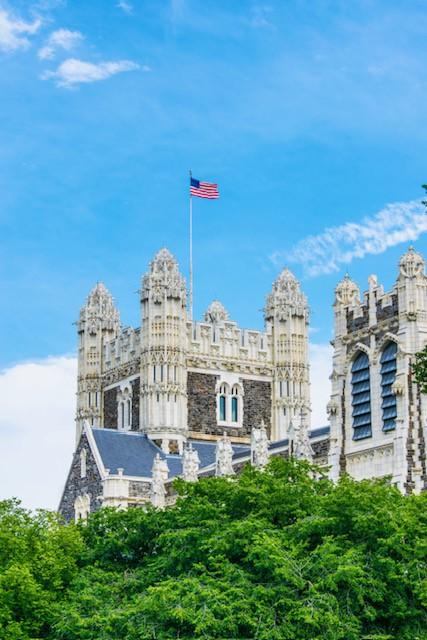
The City College will host "How Things Work," an eco-literacy conference on how environmental systems work in the face of climate change.
"How Things Work," an eco-literacy conference on how environmental systems function in the face of climate change, takes place at The City College of New York on Tuesday, March 5. Up to 300 New York City students from middle school-level to college undergraduates will attend. Other participants include educators, stakeholders and climate change advocates.
The day-long conference, from 10 a.m. to 3 p.m. in The Great Hall located in CCNY’s Shepard Hall, is co-hosted by the CCNY-based City University of New York Remote Sensing Earth System Institute (CUNY CREST), the Environmental Education Advisory Council (EEAC-NYC), and the James Baldwin Outdoor Learning Center (JBOLC).
Participants will learn how environmental systems work from exhibits, guest speakers, and activities. Exhibitors will help attendees build on their eco-literacy, and how students and educators can play a role to feel empowered and take action in addressing environmental stewardship and climate resiliency. In addition, students and educators will learn about a range of projects from green roofs to the rollout of hydrogen fuel cell buses and electric school buses.
Exhibitors include: the New York City Department of Parks & Recreation (Sustainable Facilities), Trust for Public Land, NYC Comptroller's Office, Sanitation Foundation, Empire Clean Cities, The Bronx is Blooming, Sims Municipal Recycling (Balcones Recycling), Lower East Side Ecology Center, North Brooklyn Parks Alliance, New York City Department of Health and Mental Hygiene, New York City Department of Environmental Protection, Christodora, Billion Oyster Project, WhyMaker, Solar One, New York League of Conservation Voters Education Fund (NYLCVEF), Climate and Resilience Education Task Force (CREFT), DURO UAS, and CUNY CREST.
North Brooklyn Parks Alliance, for instance, will demonstrate how a native plant nursery in the city operates. Billion Oyster Project highlights the bountiful life in the city’s water and its continued resurgence thanks in no small part to the role oysters and other keystone species play in environmental restoration.
Amanda Levy, City Research Scientist and Community Outreach and Health Education Lead with NYC Dept. of Health and Mental Hygiene will demonstrate how climate change impacts mosquito-borne diseases and how these diseases can be prevented and controlled by intervention and mitigation efforts by individuals and the community.
For more information, contact the following organizers: Shakila Merchant,
smerchant@ccny.cuny.edu
(347) 730.2008; Ray Pultinas,
raypultinas@gmail.com
(917) 755 3559; and Mike Zamm,
cenyctso@hotmail.com
(917) 582 6259.
About the CUNY CREST Institute
The CUNY Remote Sensing Earth System Institute, was officially approved by CUNY Board of Trustees in June 2010. The goal of the Institute is to serve as a CUNY-wide Institute of Excellence in Advancement of Earth System Sciences and application of Remote Sensing Technology as well as other emerging technologies. The Institute serves as a major hub of outstanding interdisciplinary research across CUNY colleges. The institute is designed to be a collaborative environment from faculty and scientists from different CUNY campuses to be able to work together in a variety of topics related to earth system sciences. The institute’s collaborative environment will enhance the advancement of science at CUNY and will create opportunity to attract external support.
About The City College of New York
Since 1847, The City College of New York has provided a high-quality and affordable education to generations of New Yorkers in a wide variety of disciplines. CCNY embraces its position at the forefront of social change. It is ranked #1 by the Harvard-based Opportunity Insights out of 369 selective public colleges in the United States on the overall mobility index. This measure reflects both access and outcomes, representing the likelihood that a student at CCNY can move up two or more income quintiles. Education research organization Degree Choices ranks CCNY #1 nationally among universities for economic return on investment. In addition, the Center for World University Rankings places CCNY in the top 1.8% of universities worldwide in terms of academic excellence. Labor analytics firm Lightcast puts at $3.2 billion CCNY’s annual economic impact on the regional economy (5 boroughs and 5 adjacent counties) and quantifies the “for dollar” return on investment to students, taxpayers and society. At City College, more than 15,000 students pursue undergraduate and graduate degrees in eight schools and divisions, driven by significant funded research, creativity and scholarship. In 2023, CCNY launched its most expansive fundraising campaign, ever. The campaign, titled “Doing Remarkable Things Together” seeks to bring the College’s Foundation to more than $1 billion in total assets in support of the College mission. CCNY is as diverse, dynamic and visionary as New York City itself. View CCNY Media Kit.